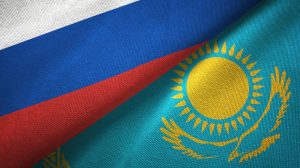A pair of Russian citizens have been granted asylum-seeker status in Kazakhstan, pausing extradition proceedings against them. But there is no guarantee they will ultimately be granted asylum.
Aikhal Ammosov and Natalya Narskaya, both Russian citizens, are detained in Almaty, Kazakhstan, and wanted by Moscow.
Narskaya, a vocal teacher from Moscow, was detained in Almaty in late July, with Russian authorities seeking her extradition om charges of making “calls for extremist activity.”
As reported by SOTA (described by the Committee to protect Journalists as “one of the last independent news outlets in Russia”) in September, she had given an interview in November 2022 in which she criticized the Russian invasion of Ukraine and described herself as a “Russophobe.” SOTA’s report cited other political prisoners detained at the same facility — such as Aigerim Tleuzhanova — as saying that Narskaya was suffering a metal breakdown in detention and was struggling to trust even those trying to help her, such as the Kazakhstan International Bureau for Human Rights and Rule of Law (KIBHR), which reportedly provided her with a lawyer.
In early October, SOTA warned that Narskaya was going to be extradited to Russia by the end of the month.
Ammosov (whose real name is Igor Ivanov) has also been detained in Almaty and reportedly granted asylum-seeker status. A Russian anti-war activist and musician from Sakha (Yakutia), he was first detained in Russia in August 2022. According to KIBHR he had attempted to hang a banner in Yakutsk that said “Yakutian punk against war.” He was given a 15-day sentence and fined for “discrediting” the Russian Army and then released, with orders not the leave the country. But at some point he left Russia for Kazakhstan.
In early October he was arrested in Almaty and given a 40-day pre-trial detention order, “in connection with an extradition issue.” It appears Ammosov also faces charges of extremism in Russia for his anti-war activities.
On Facebook, lawyer Murat Adam announced this week that Ammosov and Narskaya were both granted asylum-seeker status. He wrote that this suspends the decision to extradite them but stressed that they have not yet been granted asylum.
Indeed, there are reportedly only 327 people with refugee status in Kazakhstan. Denis Dzhivaga, a deputy director at KIBHR, told The Moscow Times in September that Russians applying for refugee status or asylum can expect rejection “with a 90% certainty.” (The report is worth reading, as it dives into the various kinds of Russians seeking safety in Kazakhstan and their different challenges).
In September 2022, after Russian authorities announced a “patrial mobilization,” a veritable wave of Russians flowed into Central Asia. Although at the time, Kazakh President Kassym-Jomart Tokayev urged the country to welcome the fleeing Russians — saying, “We must take care of them and ensure their safety. This is a political and humanitarian issue” — Astana also pledged to extradite Russians if they were under criminal investigation.
Kazakhstan seems to take a Semisonic “Closing Time” approach to asylum seekers — whether Uyghurs, Russians, Karakalpaks, or others — that is: “you don’t have to go home, but you can’t stay here.”
Those detained in Kazakhstan and wanted by other countries are not always deported, but extremely rarely are they granted the right to stay in Kazakhstan.
This happened in the case of Sayragul Sauytbay, an ethnic Kazakh who was wanted by Chinese authorities for exposing details of the internment camps in Xinjiang. She ended up in Sweden instead. Recent developments in the cases of several Karakalpaks, in which they were released from detention after a year, but denied asylum, follow this pattern.
Some Russians have not been so lucky. In December 2022, Kazakhstan extradited Mikhail Zhilin, a Russian FSB officer. Zhilin had been detained in late September 2022 after illegally hiking across the Kazakh border, without a passport. His asylum request was denied and he was deported back to Siberia, where he was sentenced to six and half years in prison.

































